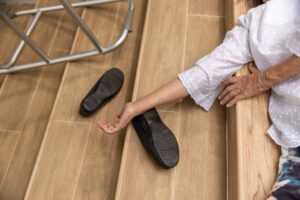What to Do If Your Loved One Frequently Falls in a Nursing Home
Nursing Home AbuseFrequent falls in nursing homes can have devastating consequences for elderly residents. These falls not only result in physical injuries but also take an emotional and psychological toll on the residents and their families. You must address frequent falls as potential signs of neglect and take appropriate action to ensure the safety and well-being of your loved one.
If your loved one frequently falls in a nursing home, it is natural to feel concerned about their safety.
Now is the time to take action and advocate for your loved one. Document each fall incident and seek legal assistance. Contact a nursing home neglect attorney to ensure your loved one’s rights and safety are protected. Remember, you are not alone, and help can provide the well-being of your loved one.
Understanding the Causes of Falls in Nursing Homes
 Falls among elderly residents in nursing homes can occur due to various reasons. Understanding these causes is important in addressing the issue effectively. Some common causes of falls include:
Falls among elderly residents in nursing homes can occur due to various reasons. Understanding these causes is important in addressing the issue effectively. Some common causes of falls include:
Medical Conditions
Many elderly nursing home residents suffer from medical conditions that can contribute to falls. Mobility issues, such as muscle weakness or joint pain, can make it difficult for residents to maintain balance and stability.
Certain medications can also cause dizziness or lightheadedness, increasing the risk of falls. Even still, the nursing home and its staff must mitigate the risk of falls.
Environmental Hazards
Nursing homes must provide a safe environment for their residents. However, environmental hazards can contribute to falls. Slippery floors, poor lighting, cluttered walkways, and improper furniture can increase the risk of accidents.
Lack of Adequate Staffing or Improper Training
Nursing homes must hire sufficient, adequately trained staff members to assist residents. However, understaffing or staff members who lack proper training can result in inadequate supervision and care, leading to falls.
Legal Obligations of Nursing Homes
Nursing homes must provide a safe environment for their residents. They must implement fall prevention programs, assess each resident’s risk of falls, and provide necessary assistance and supervision. Neglecting these obligations can result in serious consequences for the residents.
Frequent falls can also signal neglect or poor care in a nursing home. If falls continue to occur despite the facility’s knowledge and lack of action to prevent them, it may indicate a systemic issue or a disregard for the residents’ safety.
The Consequences of Frequent Falls
Frequent falls in nursing homes can have physical and emotional consequences for elderly residents. Understanding these consequences illuminates the severity of the issue and the need for action.
Physical Consequences
Frequent falls can lead to serious physical injuries, such as broken bones, head injuries, and worsening health conditions.
These injuries can result in increased pain, hospitalizations, and even permanent disability or reduced mobility. Falls can also exacerbate existing health conditions, making it difficult for residents to recover and maintain their well-being.
Emotional and Psychological Impact
The emotional and psychological impact of frequent falls should not be underestimated. Residents who experience falls may fear falling again, leading to a reduced quality of life.
This fear can result in isolation and decreased physical activity, further contributing to their overall decline in health. Elderly residents may also experience anxiety and depression due to the negative impact of falls on their physical and emotional well-being.
Financial and Medical Burden on Families
Frequent falls in nursing homes can also place a significant financial and medical burden on the families of elderly residents.
Medical expenses resulting from falls, such as hospitalizations, surgeries, and rehabilitative care, can quickly add up. Families may also need to invest additional resources in monitoring and providing extra care for their loved ones to ensure their safety and well-being.
Systemic Issues in Nursing Home Care
Recurring falls in a nursing home can signal systemic issues in the facility’s care. It may indicate a lack of proper training or supervision, understaffing, or a disregard for the safety and well-being of residents.
Addressing and resolving these systemic issues is essential to ensure all residents’ safety and quality of care.
What to Do When Your Loved One Experiences Frequent Falls
If your loved one frequently falls in a nursing home, to address the issue and advocate for their safety:
Gather Information
Start by gathering information about the circumstances surrounding the falls. Talk to the nursing home staff and ask them about the specific incidents. Review medical records, incident reports, and fall prevention protocols to understand the situation better.
Monitor Your Loved One
Observe your loved one’s physical and emotional condition closely. Look for signs of neglect, such as unexplained injuries, bruises, or bedsores. Document any changes in their overall well-being or behavior.
Document Everything
Keep a detailed log of all incidents, correspondence with the nursing home, and any actions the facility takes. This documentation will help if you need to escalate the matter further or seek legal assistance.
If you believe your loved one is a victim of nursing home neglect or abuse, contact an experienced nursing home lawyer near you to explore your options.
When to Contact a Nursing Home Attorney
 If your concerns about your loved one’s frequent falls in a nursing home are not adequately addressed, it may be necessary to seek legal assistance.
If your concerns about your loved one’s frequent falls in a nursing home are not adequately addressed, it may be necessary to seek legal assistance.
Certain signs require legal intervention:
- Recurring falls despite voicing concerns and reporting incidents.
- Evidence of neglect, such as understaffing or unsafe conditions in the nursing home.
- Lack of transparency or cooperation from the nursing home staff.
Contacting a compassionate nursing home lawyer can help in several ways:
- Investigating potential neglect or abuse: Nursing home neglect lawyers have experience in investigating nursing home facilities to determine if neglect or abuse is taking place. They can gather evidence, interview witnesses, and evaluate the overall care provided by the facility.
- Holding the nursing home accountable: By hiring a skilled nursing home attorney, you can hold the nursing home accountable for their duty of care. The lawyer can help pursue legal action to seek justice for your loved one and ensure that the facility takes appropriate measures to prevent future falls and provide the necessary care.
- Recovering compensation: If your loved one has suffered injuries or damages due to frequent falls in the nursing home, a seasoned nursing home lawyer can help recover compensation for medical expenses, pain, and suffering.
How to Choose the Right Nursing Home Lawyer
Choosing the right nursing home neglect lawyer is an imperative step in protecting your loved one’s rights and ensuring their safety. You want to find someone with the right skills, experience, and approach to handle this sensitive situation effectively. Start by seeking a lawyer well-versed in elder neglect and nursing home abuse cases to advocate for your loved one.
A good lawyer should also have a solid understanding of local and federal regulations governing nursing homes. This knowledge allows them to handle the complexities of the legal system and build a strong case that holds the facility accountable.
Research their track record of success. Look for testimonials or reviews from previous clients to understand their ability to secure positive outcomes.
Compassion and responsiveness are also key qualities to prioritize. Handling an elder neglect and abuse case can be emotionally taxing, and you need an attorney who listens to your concerns, communicates clearly, and guides you through the process with empathy and care.
Their support can make all the difference during such a challenging time.
Legal Rights of Nursing Home Residents
Nursing home residents have legal rights that protect them from neglect and abuse:
- The right to safe and adequate care
- The right to be free from neglect and abuse
- The right to privacy and dignity
Nursing homes must implement fall prevention programs and provide a safe environment that promotes residents’ well-being. Frequent falls in nursing homes may violate these rights and constitute neglect or a breach of legal obligations.
Steps in Filing a Neglect Claim
 If you need legal action, here is an overview of the steps involved in filing a neglect claim. Acting promptly and following the right process can protect your loved one’s rights and serve justice on the responsible parties.
If you need legal action, here is an overview of the steps involved in filing a neglect claim. Acting promptly and following the right process can protect your loved one’s rights and serve justice on the responsible parties.
Initial Consultation With a Nursing Home Lawyer
Start by consulting a nursing home lawyer. This meeting allows the lawyer to evaluate your case, understand the details of the neglect, and provide guidance on the best course of action. They will also explain your legal options and outline what to expect during the process.
Investigation of the Nursing Home’s Practices and Policies
Once you decide to move forward, your attorney will thoroughly investigate the nursing home’s practices and policies. It includes gathering evidence such as medical records, incident reports, and photographs of injuries.
They may also interview witnesses, including staff, residents, and other family members, to build a strong case.
Filing a Lawsuit or Negotiating a Settlement
Based on the investigation findings, your nursing home neglect attorney may file a lawsuit against the nursing home or pursue a negotiated settlement. They will seek compensation for your loved one’s damages, such as medical expenses, pain and suffering, and emotional distress while holding the facility accountable for its negligence.
Potential Outcomes
The outcomes of a neglect claim can vary depending on the circumstances. If the case goes to court, a judge or jury will determine the verdict, which may include monetary compensation and mandates for changes in the facility’s operations.
If you settle, the parties negotiate the terms. Such outcomes provide justice for your loved one and may improve care standards within the nursing home.
The Importance of Acting Quickly
You will want to act quickly when filing a neglect claim, as statutes of limitations set deadlines for initiating legal action. These deadlines vary by state, and missing them can jeopardize your case. Consult your nursing home attorney early to complete all filings on time, and fully protect your loved one’s rights.
Protect Your Loved One by Contacting a Nursing Home Lawyer Today
Frequent falls in nursing homes are a serious issue that can have severe consequences for elderly residents. If your loved one frequently falls in a nursing facility, take action and advocate for their safety and well-being.
By documenting each fall, communicating with nursing home administrators, and seeking legal assistance if necessary, you can protect your loved one’s rights and ensure that they receive the care and respect they deserve.
Remember, you are not alone in this journey, and nursing home attorneys can provide the experience and solutions needed to achieve the best outcome for your loved one.
A lawyer skilled in nursing home neglect cases has the knowledge and experience to assess the situation and recover compensation for negligence or abuse.
Nathan Hughey, an attorney and fourth-generation South Carolinian, founded Hughey Law Firm in 2007. Before that, he spent five years defending nursing homes and insurance companies. Leveraging his experience, he now advocates for those injured or wronged by such entities, securing over $220 million in verdicts and settlements.
